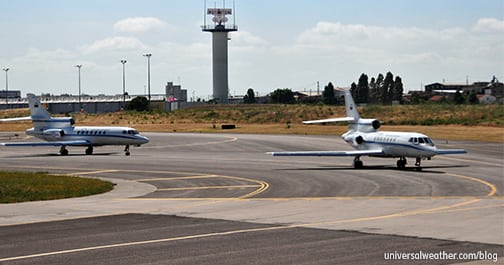How to Overcome Airports with Slot Issues: Part 2 – Slot Challenges

This business aviation blog post continues from our article last week, titled “How to Overcome Airports with Slot Issues: Part 1 – Slot Basics and Tips.“
Some airports are more challenging than others in terms of obtaining/revising airport slots. Certain locations confirm slot requests well prior to day of operation while others may not confirm slots until a few days, or even 24 hours, prior to operation. At locations where slots are not confirmed until close to day of operation it’s usually best to make all local ground handling and service arrangements, even if you have not yet received a confirmed slot.
The following is an overview of what you need to know:
1. Dealing with slot challenges
If airport slots are not available when you need them, consider revising your schedule or choosing an alternate airport. In many cases there will be good airport alternates close by. For Singapore you can use Seletar (WSSL) if desired slot times are not possible at Changi (WSSS). If Dubai Intl (OMDB) does not have slots available consider using Al Maktoum Intl (OMDW), and Marseille (LFML) is a practical alternate for Nice (LFMN). Closest alternates for some locations, such as St Petersburg (ULLI) are in other countries – Tallinn (EETN) or Helsinki (EFHK). At other locations, including Delhi (VIDP) and Mumbai (VABB), there are no nearby alternates to consider, and this may require revising your schedule to meet slot availability.
2. Missing an airport slot
If you miss a confirmed slot time and are outside the permitted validity – for other than weather delay issues – your flight could be rejected, and you may be prevented from landing. In most cases, however, local air traffic control (ATC) will work with you to try to get the aircraft to the airport. But, there may be repercussions. Some airports, if you miss a confirmed slot, may fine you or even detain crew for several hours. A letter may be sent to the aircraft operator banning them from using the airport for up to one month.
3. Revising airport slots
At airport slot controlled airports that are not highly congested – such as Stansted (EGSS) – it’s generally easier to obtain and revise airport slots. At other airports, however, it will be more difficult to revise confirmed slots due to lack of slot availability. Beijing (ZBAA) or Changi (WSSS), for example, seldom allow opportunities to improve on confirmed airport slots, and you may have to revise your schedule, to suit available slots, or switch airports altogether. Hong Kong (VHHH) has become inundated with traffic over recent years, and Macau (VMMC) is often a preferred option in terms of an alternate with slot flexibility—but even that airport can get inundated.
In China you may not have the ability to change or revise approved airport slots and will need to adapt your schedule to suit available slots. At some airports in China you’ll only be permitted one airport slot during daily peak operating hours. This doesn’t permit operators to schedule tech stops at these airports or make it difficult to accomplish quick day trips to the location.
4. Short notice slot requests
In many cases short notice airport slot requests are not an issue. Short notice requests are seldom problematic at EGSS or Luton (EGGW). Amsterdam (EHAM) is another location where airport slots usually match up to what you request, particularly as slot requirements here are only in effect certain times of day. At congested airports, however, available airport slots may be off your anticipated schedule by as much as four hours and this could impact crew duty day limitations for some operators.
5. Additional reading: Airports with Slot Issues – Series Index
Note: Links will be updated as articles are published.
Conclusion
For the most successful airport slot outcomes it’s best to have a firm schedule and request airport slots as early as possible. In some cases, you’ll need to make adjustments to schedule, or change airports, in order to accommodate passenger schedule commitments. Best practice, when applying for airport slots at busy/congested airfields, is to always have a backup plan.
Stay tuned for Part 3, which covers airport considerations and slots.
Questions?
If you have any questions about this article or need assistance arranging your slots for your upcoming trip, contact me at katherineperry@univ-wea.com.




